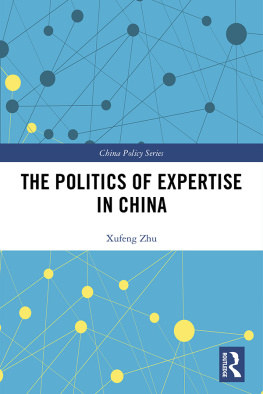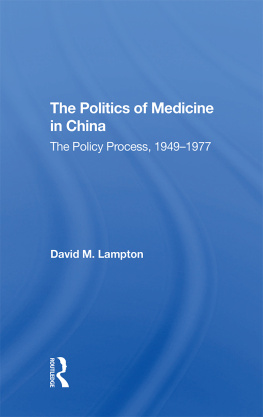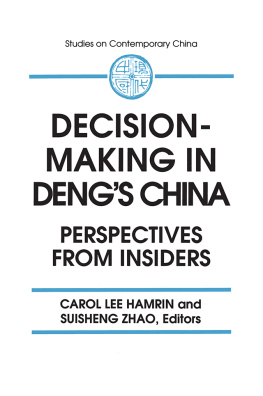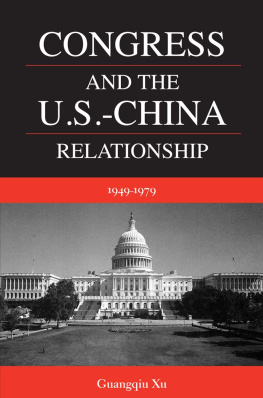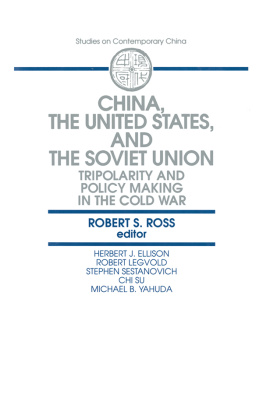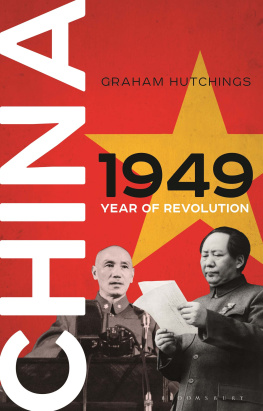Economic Policy Making in China (19492016)
This book explores the key ideas and the key people who were responsible for the development of Chinas economy from 1949 through 2016. It discusses how economic policy evolved, how economic policy was formulated and how the role of economists in decision making evolved. It considers the interplay between ideological and practical questions, provides biographical details of key economists and includes a clear annotated chronology of events. The book is especially valuable because the author, as a senior World Bank official, was a close observer of the situation and, to some extent, a key participant.
Pieter Bottelier is a Visiting Scholar at Johns Hopkins University School of Advanced International Studies in Washington, D.C. He became fascinated by Chinas economic reforms and development when he served as Chief of the World Banks resident mission in China in the 1990s.
Routledge Contemporary China Series
Chinas Soviet Dream
Propaganda, Culture, and Popular Imagination
Yan Li
Deng Xiaoping and Chinas Foreign Policy
Ronald C. Keith
Corporate Social Responsibility Reporting in China
Evolution, Drivers and Prospects
Jieqi Guan and Carlos Noronha
Chinas Generation Gap
Jiaming Sun and Dongmei Cheng
China Reclaims World Power Status
Putting an End to the World America Made
Paolo Urio
The Economic Roots of the Umbrella Movement in Hong Kong
Globalization and the Rise of China
Louis Augustin-Jean and Anthea H.Y. Cheung
Chinas Hydro-politics in the Mekong
Conflict and Cooperation in Light of Securitization Theory
Sebastian Biba
The Power of Relationalism in China
Leah Zhu
Economic Policy Making in China (19492016)
The Role of Economists
Pieter Bottelier
For our full list of available titles: www.routledge.com/Routledge-Contemporary-China-Series/book-series/SE0768
First published 2018
by Routledge
2 Park Square, Milton Park, Abingdon, Oxon OX14 4RN
and by Routledge
711 Third Avenue, New York, NY 10017
Routledge is an imprint of the Taylor & Francis Group, an informa business
2018 Pieter Bottelier
The right of Pieter Bottelier to be identified as author of this work has been asserted by him in accordance with sections 77 and 78 of the Copyright, Designs and Patents Act 1988.
All rights reserved. No part of this book may be reprinted or reproduced or utilised in any form or by any electronic, mechanical, or other means, now known or hereafter invented, including photocopying and recording, or in any information storage or retrieval system, without permission in writing from the publishers.
Trademark notice: Product or corporate names may be trademarks or registered trademarks, and are used only for identification and explanation without intent to infringe.
British Library Cataloguing-in-Publication Data
A catalogue record for this book is available from the British Library
Library of Congress Cataloging-in-Publication Data
Names: Bottelier, Pieter, author.
Title: Economic policy making in China (19492016) : the role of economists /
Pieter Bottelier.
Description: Abingdon, Oxon ; New York, NY : Routledge, 2018. | Series:
Routledge contemporary China series ; 187 | Includes bibliographical
references and index.
Identifiers: LCCN 2017052063 | ISBN 9781138306318 (hardback) | ISBN
9781315141725 (ebook)
Subjects: LCSH: ChinaEconomic policy1949 | EconomistsChina.
Classification: LCC HC427.9 .B63 2018 | DDC 330.951/05dc23
LC record available at https://lccn.loc.gov/2017052063
ISBN: 978-1-138-30631-8 (hbk)
ISBN: 978-1-315-14172-5 (ebk)
Typeset in Times New Roman
by Apex CoVantage, LLC
For Grace, whose piano performances and master classes in China in the 1990s contributed to the countrys opening up and a revival of interest in classical music.
The genesis of this book is my curiosity about the contributions of Chinese economists to economic policy making in China since the beginning of communist rule. Chinas rather sudden emergence as a global economic power in the last few decades remains a puzzle to most. How could they have achieved so much, following policies that were quite unorthodox and sometimes wrong in Western eyes?
Management of the economy under Mao Zedong was totally subordinate to politics. It was only after Maos death and the arrest of the Gang of Four in 1976 that technocrats gained influence on economic policy making in China. From then on, management of the economy became increasingly driven by non-ideological, pragmatic considerations until, in recent years, under the leadership of Xi Jinping, political considerations began to dominate once again, or so it seems.
The story of Chinas economic miracle and the names of most top political leaders since 1949, Mao Zedong, Hua Guofeng, Deng Xiaoping, Hu Yaobang, Zhao Ziyang, Jiang Zemin, Hu Jintao and Xi Jinping, are well-known, but who were the economists who contributed, or tried to contribute, to the policy-making process? What and where did those theoreticians, as they were often called, study? What did their analysis of Chinas economy tell them and what was their policy advice? Who were their professional peers abroad? How effective were they in their roles as analysts and advisors?
When I started working on this project, I aimed at limiting my efforts to the period since Deng Xiaopings opening up and reform policies of the late 1970s and early 1980s. However, I soon realized that it is hard to understand and explain the direction and content of those policies without reference to economic developments and policy making during the preceding decades under Mao Zedong and his immediate successor, Hua Guofeng. So, I broadened the scope of this study and went all the way back to 1949 when, on 1 October, Mao proclaimed the establishment of the Peoples Republic of China and pursued policies aimed at creating a socialist economic system, initially on the Soviet model.
I had the opportunity to observe first-hand how economic policy is made in China when I headed the World Banks office in Beijing in the early and mid-1990s. The political system had then recovered more or less from the Tiananmen disaster of 1989, and economic reform efforts were resumed with vigor and a clear sense of purpose. It was in many ways a unique period. I was greatly impressed by the professionalism and dedication of senior officials I interacted with in overseeing the World Banks huge financial and technical assistance program for China during those years. My Chinese counterparts were keenly interested in learning from international experience and frequently used international development agencies such as the World Bank, as sources of knowledge and advice. There was no arrogance or defensiveness on their part. They werent afraid of loan conditionality on the contrary they welcomed it as an instrument to promote development. Many went abroad for study on foreign scholarships. The World Bank undertook hundreds of studies on various aspects of Chinas economy often jointly with Chinese counterparts to inform and guide the policy-making process. There were numerous conferences and seminars to discuss ideas, learn from international experience and train officials.



